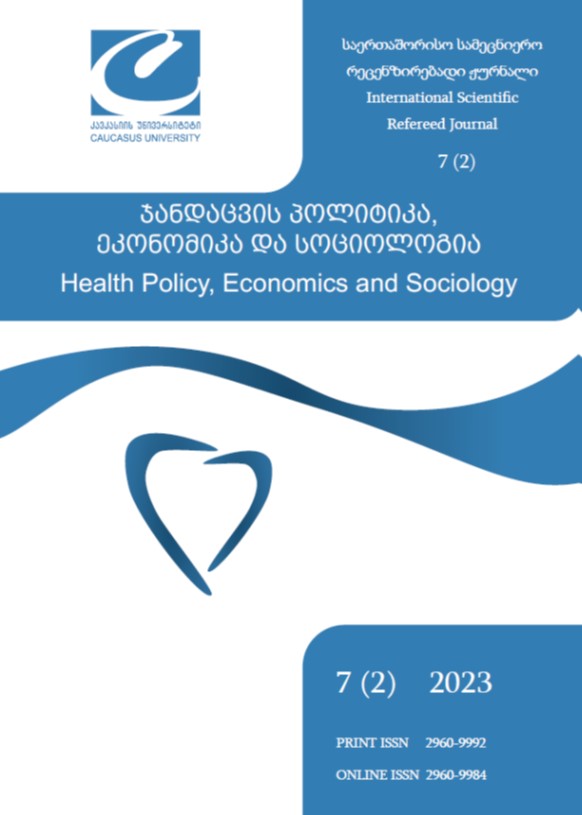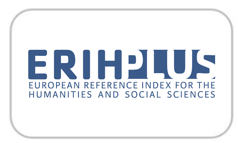ნაადრევი მშობიარობის ტენდენციები საქართველოს დაბადების რეგისტრის მონაცემების მიხედვით
DOI:
https://doi.org/10.52340/healthecosoc.2023.07.02.01საკვანძო სიტყვები:
მკვდრადშობადობა, დაბადების რეგისტრი, ნაადრევი მშობიარობაანოტაცია
შესავალი: ნაადრევი მშობიარობა აქტუალურია როგორც განვითარებული, ისე განვითარებადი ქვეყნებისთვის. თუ განვითარებულ ქვეყნებში ნაადრევი მშობიარობა დედობის გვიან ასაკში დაგეგმვას ეხება, ღარიბ ქვეყნებში ორსულობის მეთვალყურეობის ხარვეზებთან და სხვადასხვა პათოლოგიებთანაა კავშირში. კვლევის მიზანს წარმოადგენდა საქართველოში ნაადრევი მშობიარობის შესწავლა დაბადების რეგისტრის მონაცემების ანალიზის მიხედვით. მეთოდოლოგია: განხორციელდა საქართველოს დაბადების რეგისტრის 4 წლის მონაცემების (2017-2020 წწ.) რეტროსპექტული შესწავლა და აღწერილობითი, სტატისტიკური ანალიზი. მონაცემების დამუშავება მოხდა SPSS პროგრამის საშუალებით. საკვლევ პოპულაციად განისაზღვრა ყველა ის ქალი, რომელმაც იმშობიარა კვლევის პერიოდში (2017-2020) და მშობიარობის სტატუსი იყო „ნაადრევი“. შედეგები, დისკუსია: კვლევამ გამოავლინა ნაადრევი მშობიარობების ზრდის ტენდენცია. ნაადრევ მშობიარობას ძირითადად 20-29 ასაკობრივ კატეგორიაში აქვს ადგილი. ნაადრევი მშობიარობის უმეტესობა (42,6%) მოდიოდა იმ დედებზე, რომლებსაც ჰქონდა ორსულობის 3 ან მეტი შემთხვევა. ნაადრევი მშობიარობის შემთხვევაში მკვდრადშობილების რაოდენობა შემცირების ტენდენციით ხასიათდება. ნაადრევი მშობიარობა და ნაყოფის მცირე მასა ერთმანეთთან მჭიდროდ არის დაკავშირებული, რაოდენობრივად ყველაზე მეტი შემთხვევა თბილისში აღირიცხა, რაც განპირობებულია დედაქალაქში ურბანიზაციის მაღალი მაჩვენებლებით. ნაადრევი მშობიარობის შემთხვევაში ანტენატალური ვიზიტებისთვის არც ერთხელ არ მიუმართავს ორსულების 7,7%-ს (n=1305). საყურადღებოა, რომ ნაადრევი მშობიარობების დიდ ნაწილში (59,4%) მშობიარობის გზა იყო საკეისრო კვეთა. დასკვნა: თითოეული ორსული ჩართული უნდა იყოს ანტენატალური მეთვალყურეობის პროგრამაში და ისარგებლოს განსაზღვრული ვიზიტებით. ნაადრევი მშობიარობის შესამცირებლად მნიშვნელოვანია ორსულებში ჯანსაღი ცხოვრების წესის ხელშეწყობა. საჭიროა საკეისრო კვეთის მაღალი მაჩვენებლების მიზეზების ანალიზი.
წყაროები
დაავადებათა კონტროლის ეროვნული ცენტრი (2022), ჯანმრთელობის დაცვა, საქართველო, სტატისტიკური ცნობარი. 2020წ. https://www.ncdc.ge/#/pages/file/3d9d1b31-4198-4127-90bb-41db1b80aa63 ნანახია 10.05.2023
დაავადებათა კონტროლის ეროვნული ცენტრი (2022) სტატისტიკური ცნობარი 2021, https://www.ncdc.ge/#/pages/file/ea1784b5-d3d0-4dd9-b29f-1369f5d6bbec ნანახია 10.05.2023
Anda, E., Nedberg, I., Rylander, C., Gamkrelidze, A., Turdziladze, A., Skjeldestad, F., Ugulava, T. and Brenn, T., (2017). Implementing a birth registry in a developing country – experiences from Georgia. DOI: 10.4045/tidsskr.17.0553.
Centers for Disease Control and Prevention.(2022) Premature birth. https://www.cdc.gov/reproductivehealth/features/premature-birth/index.html#:~:text=Some%20risk%20factors%20for%20preterm,has%20to%20be%20delivered%20early. ნანახია 12.03.2023
IRGENS, L., 2000. The Medical Birth Registry of Norway. Epidemiological research and surveillance throughout 30 years. DOI: 10.1034/j.1600-0412. 2000.079006435.x
Goldenberg, R.L. et al. (2008) ‘Epidemiology and causes of preterm birth’, The Lancet, 371(9606), pp. 75–84. doi:10.1016/s0140-6736(08)60074-4.
Manjavidze, T., Rylander, C., Skjeldestad, F., Kazakhashvili, N. and Anda, E., (2020). Unattended Pregnancies and Perinatal Mortality in Georgia. DOI: 10.2147/RMHP.S243207
Muhumed, I.I., Kebira, J.Y. and Mabalhin, M.O. (2021) Preterm birth and associated factors among mothers who gave birth in Fafen Zone Public Hospitals, Somali Regional State, Eastern Ethiopia. RRN, Research and Reports in Neonatology. Dove Press. Available at: https://www.dovepress.com/preterm-birth-and-associated-factors-among-mothers-who-gave-birth-in-f-peer-reviewed-fulltext-article-RRN. ნანახია 14.04.2023
Oskovi Kaplan, Z.A. and Ozgu-Erdinc, A.S. (2018) “Prediction of preterm birth: Maternal characteristics, ultrasound markers, and biomarkers: An updated overview,” Journal of Pregnancy, 2018, pp. 1–8. Available at: https://doi.org/10.1155/2018/8367571.
Stringer, E., Stringer, J. and Smid, M. (2016) ‘A worldwide epidemic: The problem and challenges of preterm birth in low- and middle-income countries’, American Journal of Perinatology, 33(03), pp. 276–289. doi:10.1055/s-0035-1571199.
Vogel, J., Chawanpaiboon, S., Moller, A., Watananirun, K., Bonet, M., Lumbinganon, P., (2018). The global epidemiology of preterm birth. DOI: 10.1016/j.bpobgyn.2018.04.003
Walani, S.R. (2020) “Global burden of preterm birth,” International Journal of Gynecology & Obstetrics, 150(1), pp. 31–33. DOI: 10.1002/ijgo.13195.
World Health Organization (2022) Preterm birth. https://www.who.int/news-room/fact-sheets/detail/preterm-birth
ჩამოტვირთვები
გამოქვეყნებული
ვერსიები
- 2024-01-10 (2)
- 2023-07-28 (1)
როგორ უნდა ციტირება
გამოცემა
სექცია
ლიცენზია

ეს ნამუშევარი ლიცენზირებულია Creative Commons Attribution-ShareAlike 4.0 საერთაშორისო ლიცენზიით .













